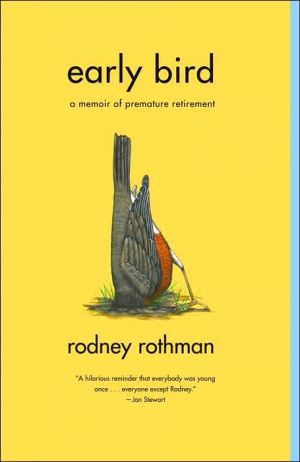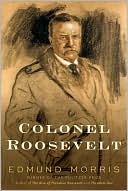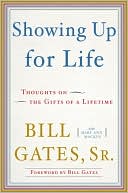Early Bird: A Memoir of Premature Retirement
Everyone says they would like to retire early, but Rodney Rothman actually did it — forty years early. Burnt out, he decides at the age of twenty-eight to get an early start on his golden years. He travels to Boca Raton, Florida, where he moves in with an elderly piano teacher at Century Village, a retirement community that is home to thousands of senior citizens.\ Early Bird is an irreverent, hilarious, and ultimately warmhearted account of Rodney's journey deep into the heart of retirement....
Search in google:
Everyone says they would like to retire early, but Rodney Rothman actually did it — forty years early. Burnt out, he decides at the age of twenty-eight to get an early start on his golden years. He travels to Boca Raton, Florida, where he moves in with an elderly piano teacher at Century Village, a retirement community that is home to thousands of senior citizens.Early Bird is an irreverent, hilarious, and ultimately warmhearted account of Rodney's journey deep into the heart of retirement. Rodney struggles for acceptance from the senior citizens he shares a swimming pool with and battles with cranky octogenarians who want him off their turf. Before long he observes, "I don't think Tuesdays with Morrie would have been quite so uplifting if that guy had to spend more than one day a week with Morrie."In the spirit of retirement, Rodney fashions a busy schedule of suntanning, shuffleboard, and gambling cruises. As the months pass, his neighbors seem to forget that he is fifty years younger than they are. He finds himself the potential romantic interest of an aging femme fatale. He joins a senior softball club and is disturbed to learn that he is the worst player on the team. Early Bird is a funny, insightful, and moving look at what happens to us when we retire, viewed from a remarkably premature perspective. Any reader who plans on becoming an old person will enjoy joining Rodney on his strange journey, as he reconsiders his notions of romance, family, friendship, and ultimately, whether he's ever going back to work. The New York Times - Neil Genzlinger Rothman manages to be both an observer of these strange beings about three times his age and a sad-sack newcomer trying to blend in with them. He is working a bit of a stereotype, but his descriptions of the loneliness, the cliquishness, the slow-motion desperation of the place ring true and bittersweet.
Early Bird\ \ I lost my job in January. The television show I was working on was canceled. I've been raised to believe that losing your job is a bad thing, but I am more relieved than disappointed. I've been working seventy hours a week for the better part of a decade. I've spent more time in my office chair than I have in my bed. My wrists twitch. My back throbs. My butt hurts. When I close my eyes, I see a blinking keyboard cursor. I'm twenty-eight years old, and far too many of my memories involve me sitting in my office after midnight, tasting every quarter-filled coffee cup on my desk until I find the one that is still a little warm.\ Now I'm off work and I don't care. I may not be a coal miner, but work is work, and I need to stop doing it for a while. I don't know what I want to do next. Everyone says I should make lists of what my priorities are and see where that takes me. It's nice sometimes to be told what to do. I try making lists of "important things," and "life goals," and "meaningful values." I take long walks, praying for epiphany. Epiphany does not come, so I get pizza instead.\ Being unemployed makes everyone around you nervous. Nobody knows what to say to you. At parties and dinners, making small talk, you're always supposed to be doing something, or at least up to something. "So what are you doing? What are you up to?" they start to ask, once a few weeks have passed.\ I tell them I'm "off work" or "taking time off," terms I've come to resent because they remind me that I'm supposed to be "on." Years ago, people would call this "taking a vacation," which had a nice, assertive ring to it, but nobody I know calls it that anymore. The first place I vacationed was Florida, to visit my grandparents. It blew my eight-year-old mind. The snowstorms and school-yard fights of my typical New York February were far away. My family rented a convertible and drove around as an actual family for once, listening to bad radio like Lionel Richie. But down in Florida, I learned, Lionel Richie sounds good! I'd get sunburned, and my grandmother would call it "healthy color." I would sleep on the world's only comfortable cot, listening to the ocean through the window screen, and my head would sing: Yeah! Jambo Jumbo!\ "I'm Jewish," I say to myself one day. "I'll end up retired in Florida anyway. Why not get a head start and check it out?"\ My friends say the whole plan sounds neurotic. My family agrees, and also wants to know if I have a date yet for my sister's wedding.\ "This is what it is," I tell my friend Jill, who I met, of course, at work — where else do you meet people these days? — when I used to be a joke writer for David Letterman, and Jill was a segment producer. "I move down to Florida and test out retirement early. I get to relax in the only place I've ever actually been relaxed. And while I'm there, I get to see what retirement is like forty years before I get there. I get to see if working hard is worth it. Maybe I meet a bunch of wise elderly people who inspire me and I somehow figure out a way to write a book about it. I've read Tuesdays with Morrie. I know how it goes."\ "You're kidding me," she says.\ "Everything is so accelerated lately," I say. "Maybe I've crammed a lifelong career into seven years."\ "Sweetie, you go insane when you're not working," she says. "You gotta go back to work."\ "I don't," I explain to her. Instead of actually doing work I can at least tell people at parties, when they ask me what I'm doing, that I'm "writing a book." Then they will say, "Oh, wow, a book, that's great." I could drag it out for years.\ Americans are surviving longer and longer these days. Between the Bronze Age and 1900 — about 4,500 years — our life expectancy extended twenty-seven years. In the last hundred years, thanks to medical advancements and better home care, our life expectancy increased the same amount. Replacement body parts, the Human Genome Project. We're going to live a long time. I don't want to get ready for those final years the way I get ready for a dental cleaning, maniacally flossing for two days to make up for months of neglect, then acting surprised when the hygienist says my gums are infected. What's neurotic about being exceedingly prepared?\ My first step is to somehow find a way to live in a retirement community. My grandfather tells me that it is unlikely I'll find one that will allow me to move in. Most Florida retirement communities have strict fifty-five-years-and-up policies. I ask him if any of his elderly friends have empty Florida condos I can squat in. I have always thought that my grandfather's wellspring of unconditional love is bottomless, but this request manages to scrape rock. He is nice enough, though, to set me up on a meeting with a New Jersey neighbor of his who keeps a condo in Boynton Beach, Florida. Unfortunately, she tells me, with a Dominican nurse sitting imposingly behind her like a bodyguard, that she is selling the condo any day now; it won't be available.\ I join Roommate Finders of Florida for one hundred dollars. I tell them I want a roommate over the age of sixty-five. They don't seem troubled by the request. Perhaps that fact should have troubled me. A few days later, they call back and say they've found me a roommate in Boca Raton. Her name is Margaret. She is in her mid- to late sixties. She lives in Century Village, one of the largest, most famous retirement communities in the country. It caters mainly to lower-middle-class Jews from the Northeast. I've heard of it before. It's one of these fully loaded communities: swimming pools, tennis courts, a huge clubhouse full of meeting rooms and social events, and more than five thousand condominium units for retired people.\ "One question," they ask. "Do you have a problem with cats or birds?"\ "Not enough of one," I say.\ The night before I leave Los Angeles for Florida, I throw myself a going away party at a tiki bar. A handful of my closest friends in the city show up. After two years here in Los Angeles, I'm still amazed by how few people I actually know well. It's not like it used to be, when we were in our early twenties and everyone would stay out late all the time. We'd all buy each other shots and then vomit together in the streets. Really great times. These days it seems like everyone is staying in; small dinner parties or just crashing out on the couch watching Six Feet Under. I wonder how much I'm really going to miss any of these people.\ For my last night, though, we rage for a few hours like the old days. People give me AmberVision glasses, adult diapers, "Sexy and Sixty" cuff links. We drink piña coladas. Naturally, there are many crude jokes made about me romancing old women. The next day on the plane, I'm glad I got drunk at my party and I'm glad I am hungover. It blunts the edge as my plane descends toward South Florida, as I wonder what the hell I am doing, looking out over the paisley landscape and beginning an early retirement.\ Copyright © 2005 by Rodney Rothman
\ From Barnes & NobleRodney Rothman's midlife crisis came early. After losing his television job at the advanced age of 28, he resigned from the working world and moved into a retirement home. Perhaps not surprisingly, the shuffleboard set at Boca Raton's Century Village regarded him as an unwelcome alien. As the months wear on, though, Rothman's acclimates to the local early-bird specials and farcical turf wars. Eventually, he even joins a senior softball club and learns to his embarrassment that he is the worst athlete on the team. Early Bird offers an offbeat, comical view of aging in public.\ \ \ \ \ Diane ScharperWith its statistics and laugh-out-loud humor, the book feels more like a stand-up comedy routine with a sociological edge than a memoir. Rothman's seniors are gutsy, feisty, frugal and sometimes irritating, as when they awaken at 6 a.m. to begin waxing and washing their cars.\ — The Washington Post\ \ \ Neil GenzlingerRothman manages to be both an observer of these strange beings about three times his age and a sad-sack newcomer trying to blend in with them. He is working a bit of a stereotype, but his descriptions of the loneliness, the cliquishness, the slow-motion desperation of the place ring true and bittersweet.\ — The New York Times\ \ \ \ \ Library JournalRothman has been a head writer for David Letterman and has contributed articles to The New Yorker, the New York Times, and McSweeney's. He has also been, at the age of 25, a retiree. Burned out after a few hectic years of work, he decided to quit and move into a retirement village in Florida. This readable account of his exploration of the world of retirement four decades ahead of time provides a glimpse of a lifestyle known popularly only through stereotypes. Rothman becomes king of the shuffleboard court. He arranges an uneasy detente with his condo mate's cats. He infiltrates the Pool Group and inveigles an invitation to canasta. Rothman has done his research, and he applies his reading on retirement to his personal situation with humorous and occasionally poignant results. Nevertheless, the book reads like one extended sketch. Some sections work particularly well, as when Rothman discusses Maribel, the woman he met via JDate. His physical reaction to dancing with a seductive older woman, however, is fair game; and discerning Rothman's guidelines for what is fair game is occasionally more engrossing than the memoir itself. Still, this readable book is recommended for purchase by larger public libraries.-Audrey Snowden, John F. Kennedy Sch., Santiago de Queretaro, Mexico Copyright 2005 Reed Business Information.\ \ \ \ \ Kirkus ReviewsA former comedy writer for David Letterman does some up-close research on a common South Florida species-the senior citizen retiree-with "findings" more suited to stand-up routine than anthropological tome. The result: lighthearted fluff with a flair, and not without its educational value. Out of work and pondering his not-so-immediate future, Rothman, 28, decides to get an early glimpse of retirement and soon finds himself sharing a Century Village condo with a widowed piano teacher, her several cats and one early rising parrot. Undaunted, the author dives into such delicacies as the ubiquitous nine-dollar "Early Bird" dinner special; a gambling cruise with an all-female social club; a late-night patrol with the volunteer senior citizen police, and "hard-core" bingo at a nearby strip-mall. He samples senior citizen softball, shuffleboard and canasta. He penetrates the cliquish Pool Club's daily poolside chats. He serves bagels at the local Jewish bakery, visits a Yoko Ono art exhibit with the very unappreciative Art Appreciation Club and, at one point, even tries Viagra. Rothman comes to no profound conclusions here. The mostly Jewish fugitives from the chilly Northeast he encounters conform in general to our imagined stereotypes. Still, seeing them up close-waxing their cars at 6:30 a.m., pilfering Equal packets from the local coffee shop, exchanging surprisingly racy jokes over breakfast bagels-makes for fun reading. And the author's fieldwork doesn't go entirely unrewarded, yielding such oddities as Amy Ballenger, a 93-year-old stand-up comic; Artie, a 63-year-old ex-heroin addict-turned real-estate-agent; and Vivian, a sultry 75-year-old Romanian with five ex-husbands and enough sexappeal to stir even the author's libido. Rothman also provides just enough serious data on aging (for example, the positive effects of staying active and socializing) to make this breezy, humorous tour both entertaining and rewarding. Witty and conversational prose, peppered alternately with sarcasm and compassion: easy, enjoyable reading.\ \








